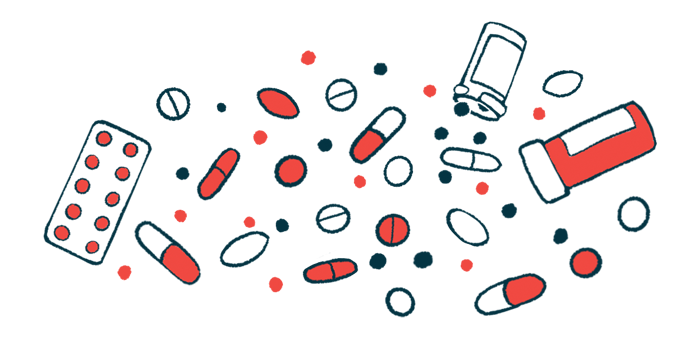Adhering to treatment is linked to better long-term outcomes
Adherent patients 21% less apt to use walker; 32% less apt to use wheelchair
Written by |

People with multiple sclerosis (MS) who take their prescribed disease-modifying therapies (DMTs) as recommended have better long-term health outcomes and lower healthcare costs than those who don’t, a U.S. study finds.
Adhering to treatment can help reduce relapses, slow disease progression, and reduce the economic burden on both the patients and the healthcare system, according to “Impact of adherence to disease modifying therapies on long-term clinical and economic outcomes in multiple sclerosis: a claims analysis of real-world data,” which was published in Multiple Sclerosis and Related Disorders.
A number of DMTs that help reduce relapses and slow disease progression are now available for treating MS. Patients must remain on treatment over the long term to achieve the best outcomes, whether their symptoms come and go in phases or gradually worsen over time.
Many find it hard to stick with their prescriptions due to “a variety of mental, physical, and emotional factors,” the researchers wrote, noting earlier studies have shown that not adhering to treatment results in “worse clinical outcomes (relapses and disease severity), a higher economic burden, and loss of work productivity.” Many of these studies looked at data from a single point in time or followed patients over a short period, however.
Researchers at Joi Life Wellness Group MS Center, EMD Serono, and the University of Southern California’s Keck Huntington Beach Multiple Sclerosis Infusion Program drew on data from IBM MarketScan’s commercial database between 2011-2017 to see if this holds true over time.
EMD Serono, which funded the study, markets Rebif (interferon beta-1a) and Mavenclad (cladribine), two approved DMTs for MS. MarketScan contains healthcare claims data from more than 60 million people in the U.S. The researchers looked for people, ages 18-65, with a diagnosis of MS via specific diagnostic codes.
Treatment adherence and long-term outcomes, costs
The study included 10,248 patients with a mean age of 48. Most (75%) were women and 12% had a relapse in the year before. The average follow-up from diagnosis or first DMT claim was 5.3 years.
DMTs included self-injectables (interferon-based medications and glatiramer acetate, sold as Copaxone or generics); Tysabri (natalizumab), Lemtrada (alemtuzumab), and Ocrevus (ocrelizumab) into-the-vein infusions; and oral medications such as teriflunomide (sold as Aubagio or generics), fingolimod (sold as Gilenya or generics), and dimethyl fumarate (sold as Tecfidera or generics).
Treatment adherence was classified for each patient based on the proportion of days covered (PDC) or the ratio between the total amount of supply days that DMTs were prescribed in follow-up and the total number of days of follow-up.
A patient with a PDC of 0.8 or higher was considered adherent, while values below 0.8 indicated nonadherence. Nonadherence was further classified as either moderate (PDC between 0.6 and below 0.8) or high (PDC below 0.6).
A total of 5,902 patients (58%) were classified as adherent, while 4,346 (42%) were nonadherent.
To ensure a fair comparison, the researchers used a technique called propensity score matching to match patients between groups in terms of age, sex, U.S. region, DMT exposure at study entry, simultaneous health conditions, and relapses in the year before study entry.
The patients who adhered to treatment had significantly better clinical outcomes than those who didn’t. These included a 17% lower chance of having a first relapse, meaning they remained relapse-free longer, and a lower annualized relapse rate (ARR) (0.13 vs. 0.18 relapses a year).
Also, those who were adherent were 21% less likely to use a cane or walker and 32% less likely to use a wheelchair than those who weren’t.
Adhering to treatment resulted in fewer annual inpatient visits (mean, 0.05 vs. 0.09) and emergency room visits (mean, 0.22 vs. 0.35) per patient. Adherent patients had more outpatient visits (mean, 16.95 vs. 16.47) and MRIs (0.72 vs. 0.68) a year.
On average, those who adhered to their DMT spent $1,400 less each year in total healthcare costs ($15,407 vs. $16,807).
The adherence-based differences in disease activity and use of healthcare resources were more pronounced between adherent patients and those with high nonadherence than between those who were adherent and those who were moderately nonadherent. These findings highlight the importance of adhering to treatment for managing MS effectively.
“This study demonstrates that nonadherence to DMTs has a significant negative impact on both MS disease activity and [healthcare resource utilization],” and “provides long-term evidence of these detrimental effects,” wrote the researchers, who noted more research involving other interested groups may better present the “impact of patient-related factors on outcomes and quality of life” with MS.
